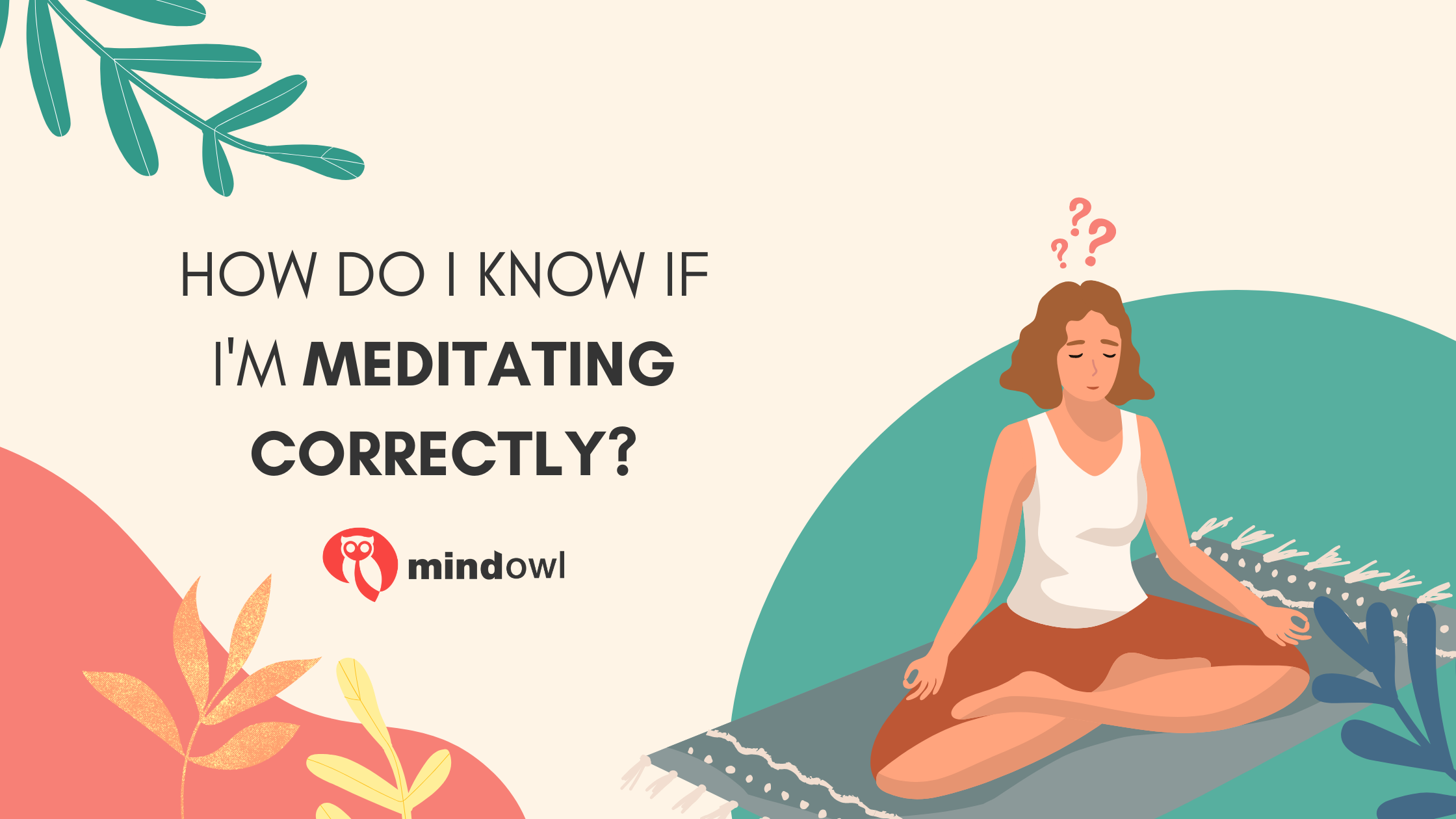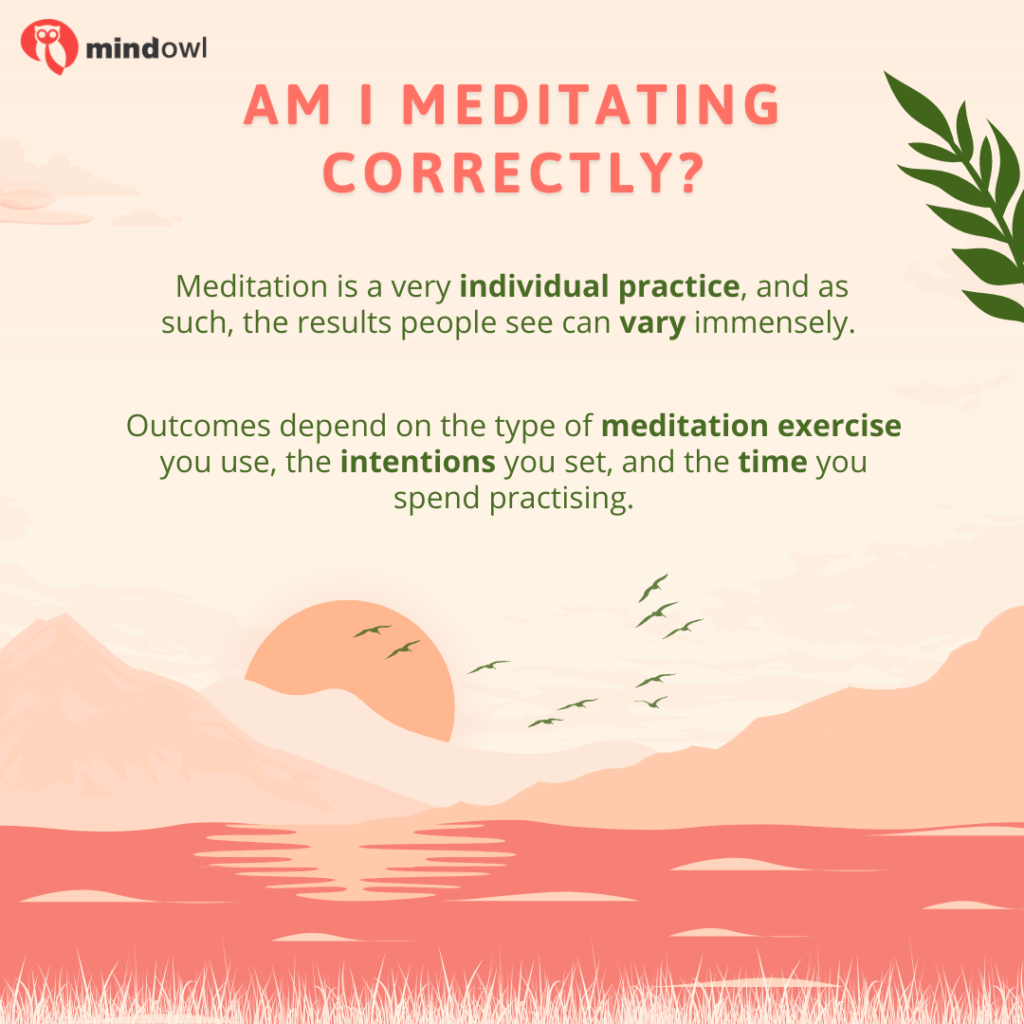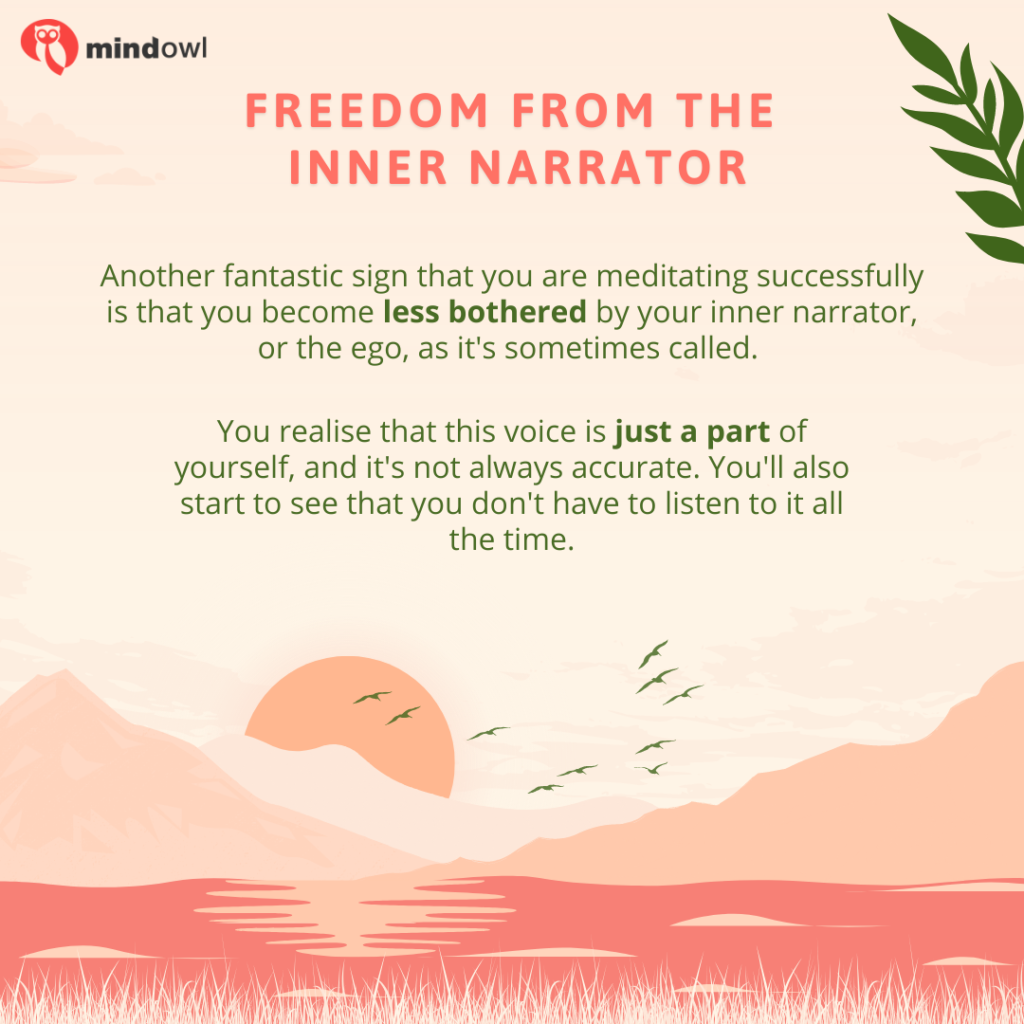Meditation is a powerful tool that can help reduce feelings of stress and anxiety, increase feelings of balance and relaxation, and lead towards greater clarity and equanimity in your life. By impacting the type of brain wave states you experience, the practice of meditation is scientifically proven to alter the way your mind works. Certain studies have found that people who meditate tend to have better social skills and are able to deal with stress better. But when you begin meditating, it’s not always easy to know if you’re doing it the right way.
Beginner meditators often get discouraged if they feel like they’re not getting fast results. This can cause people to think that they’re incapable of experiencing the positive effects of meditation, or that it’s too hard. Perhaps the only thing keeping you from meditating effectively are these negative thoughts. So how do you know if you’re meditating correctly?
Benefits of Successful Meditation
Most mindfulness meditation techniques are built around the idea of enhanced present moment awareness. However, if you think meditation is just about relaxing “in the now”, it becomes easy to believe that you’re meditating correctly when really you’re just having a moment of temporary relaxation rather than contributing towards lasting peace of mind. Defining meditation in this shallow way means you miss out on many of the benefits of meditation; these include increased focus, better sleep, improved moods and reduced stress. A regular meditation practice can help make these positive things a natural part of your daily life.
Every form of meditation has a different purpose and a different list of benefits. Trying out a variety of different practices can allow you to find the style that best matches your intention, aims, personality and life circumstances. For more on this subject, check out our article on the six main types of meditation. But for now, let’s dive deeper into exactly what it feels like to meditate correctly.
What does it feel like to meditate correctly?
Before we go any further, it’s important to note that there is not necessarily any right or wrong way to meditate. Different people do it in different ways, and that’s totally fine. Ultimately, it’s a very individual practice, and as such, the results people see can vary immensely, and you shouldn’t be disheartened if you haven’t experienced the feelings, sensations and attitude changes we’ll discuss later in the article.
As we discussed earlier, it’s easy to fall into the “relaxation” trap during a meditation session; therefore, it’s important to remember that mediation is intended to help us grow more focused, aware and mentally resilient. The practice can have a variety of different outcomes, depending on the type of meditation exercise you use, the intentions you set, and the time you spend practising.
For that reason, we’ve come up with a list of qualities that will emerge if you are meditating “correctly”. Hopefully, these qualities will help you decide if you’re doing it right, or not. Don’t worry if you feel that you are struggling to experience the benefits of meditation — we’re going to give you an arsenal of exercises to help you build your meditation muscle.
Let’s go through some of the signs that you’re meditating correctly.
Heightened awareness
One of the first signs that you’re meditating correctly is a sense of heightened awareness. This simply means that you become more aware of your surroundings, and of your own thoughts and feelings. You may notice things that you’ve never noticed before, or start to pay attention to things that you normally wouldn’t. This is a normal part of the process, and it’s a good sign that you’re on the right track!
As you become more aware of your thoughts and feelings, and their impact on you, you will be in a better position to choose how to react. You will be able to determine how your mind interprets what is actually happening. This is one of the most important parts of meditation, and it’s what can help you foster well-being in your life.
Respond, don’t react
Learning to respond and not react when you are confronted with a difficult or stressful situation is very difficult. But, with practice, it is possible to reduce the amount of time you spend being reactive by practising mindful communication and responding with compassion and awareness. When you become a more practised meditator, you’ll realise a busy brain is not necessarily a bad thing; what’s worse is having an autopilot brain.
When we allow ourselves to go into autopilot in our everyday life, we create an uninterrupted stream of stress from the moment we wake up, throughout our work schedule and during our relaxation periods, until we eventually go to bed at night. This constant stream of stress causes the autonomic nervous system to be hit with “sympathetic overload”, resulting in stress-related health problems such as high heart rate and blood pressure. Meditating every day can help trigger the parasympathetic nervous system, which promotes a state of “rest and digest” rather than “fight or flight”. This state allows our bodies to heal and feel a greater sense of calmness; this allows us to respond to situations with intention, rather than reacting with emotion or aggression. A more intentional approach to life is one of the greatest benefits mindfulness meditation can offer.
Freedom from the inner narrator
Another fantastic sign that you are meditating successfully is that you become less bothered by your inner narrator, or the ego, as it’s sometimes called. This is the voice in your head that constantly talks to you, and usually isn’t very nice! When you’re meditating, you’ll start to realize that this voice is just a part of yourself, and it’s not always accurate. You’ll also start to see that you don’t have to listen to it all the time.
This is a very important step in your journey to self-awareness, and it can be quite liberating! Once you’ve freed yourself from the inner narrator, you’ll start to see that you have more control over your life and how you react to things. You’ll also find that you’re able to handle stress and anxiety better .
A change in attitude
When we begin to meditate successfully we will often experience a change in our attitude to our life, everyday conflicts and the relationships we have with those around us. We may begin to notice these types of changes to the way we think:
- Greater Acknowledgement of the things we do have control over.
- More Gratitude for the things that are not under our control.
- Enhanced Appreciation for our life.
- Greater Compassion for those around us, and ourselves.
The “noting” practices that mindfulness is founded upon are great at helping us incorporate acknowledgement, gratitude, appreciation and compassion into our sessions. It is tempting to think that during meditation you should ignore every single thought that comes to mind, but that is a misconception. In the same vein as dealing with anxiety, it is not always beneficial to ignore every thought and stress we have; noting certain thoughts and feelings can help us manage them better.
When we catch ourselves thinking or feeling something, we can use the “noting” technique to observe the thought as it comes, but let go of the distraction and gain some clarity in our meditation practice. By thinking about which thoughts most commonly intrude our practice, or which worries throw us off course the most, we can gain a better understanding of how our minds work. Noticing distractions easily and without judgement or anger can be hard at first, but it will become easier when you meditate more regularly.
You have made it a regular practice
When you find yourself going about your day without focusing too much on whether you are doing meditation correctly, you should recognise that this is real progress. Remember, many people feel anxious about starting a new habit or trying something new. They want reassurance that they’re doing it correctly. Many seasoned and long-term meditators will tell you when they first began their meditation practice they had an overwhelming feeling of “am I doing it right?”. They would often question themselves, even though they knew deep inside they were doing it correctly. As time went on, they learned how to trust their intuition and inner guidance.
Constant self-evaluation and criticism in your practice can lead to you struggling to meditate successfully. Successful meditators will give ample time and thought to the meditation practice, but after a while, it should become easier and more natural to you. Creating an effective morning routine that prioritizes meditation first thing will give you the space to set intentions and goals for your life and become more balanced in stressful situations. When this daily meditation practice is ingrained in your routine, you should view that as an achievement.
Concentration with no effort
When we have found a meditation style that most fits our lifestyle and personality, we’ll find that your concentration improves without any effort on your part. In this stage, you don’t feel like you are doing meditation; instead, meditation happens on its own, without your effort.
When your concentration starts feeling more effortless, you’ll know you’ve made serious progress. You managed to go beyond any attempts to control the process, and it now runs on its own. Effortless Meditation is defined by a greater sense of stillness, equanimity and focus.
Don’t worry if you have not experienced these qualities of meditation in your practice yet. Just remind yourself that each session you do will bring you closer to the amazing benefits that meditation can offer. This process of training the mind will always take time, so don’t get frustrated if things don’t happen instantaneously. Treasure the process and the progress you make; your gradual path towards a more happy and peaceful mind is something to cherish.
How do I know if I’m making progress?
Meditation helps us gain control over ourselves, enabling us to discover patterns and habits of our mind, so we can cultivate new, more positive ways of being. It teaches us to focus on one thing at a time rather than being distracted by everything around us. Even if it’s just in fleeting moments, if you find yourself being more calm, patient, responsive and communicative in your daily life, it’s likely that you’re already reaping the rewards of meditation.
The goal of meditation is different for every individual, so don’t get bogged down in any dogma that you read or hear; ultimately, you know yourself better than anyone else. Although we’ve spent a while looking at what happens as a result of regular meditation practice, there’s no right or wrong way to meditate, and you don’t have to agree with everything you’re told by your meditation teacher or by online resources. However, it will hopefully be more clear to you now that successful meditation will lead to demonstrable positive changes in your outlook on life and your relationship with your inner self.
Want to find out more about understanding and taming the complex inner workings of the brain? Check out our article on how to train your monkey mind.
Frequently Asked Questions:
Q. Is there a wrong way to meditate?
A. There is no right or wrong way to meditate. However, it is extremely important to find a practice that meets your needs. Your meditation practice should always be unique and tailored to you through daily, intentional practice. Looking for somewhere to begin? Start with our article on the 6 main types of meditation, and find the best one for you!
Q. Are you supposed to think during meditation?
A. Meditation can be difficult when people believe that they shouldn’t think at all. No one can be absolutely clear of their thoughts, as you probably already know. Oftentimes, our minds are swept away by daily tasks we need to finish, general worries, intrusive thoughts and difficult moods. In mindfulness meditation, you must recognize these thoughts and allow them to exist, without acting upon them right away. You really don’t have to think about anything, if you don’t want to. There is no ‘should’ or ‘have to’. The thought process in meditation is whatever you’d like it to be.
Q. What are the signs of deep meditation?
A. During deep meditation, you lose track of time, breathe more slowly, and become less aware of yourself. When you realise that you can only remember some of what you did while meditating, your body is relaxed, and you forgot you were, it is a good sign that you are in a deep meditative state. But don’t worry if you can’t reach this straight away — it can take a lot of time and practice.
MindOwl Founder – My own struggles in life have led me to this path of understanding the human condition. I graduated with a bachelor’s degree in philosophy before completing a master’s degree in psychology at Regent’s University London. I then completed a postgraduate diploma in philosophical counselling before being trained in ACT (Acceptance and commitment therapy).
I’ve spent the last eight years studying the encounter of meditative practices with modern psychology.








